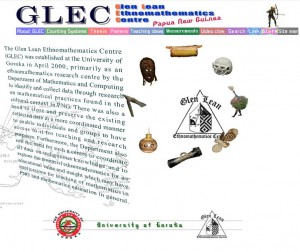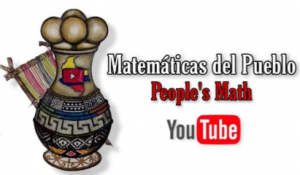New Guinea Glen Lean centre for ethnomathematics
 Brief history on the establishment of Glen Lean Ethnomathematics Centre as a research centre
Brief history on the establishment of Glen Lean Ethnomathematics Centre as a research centre
http://www.uog.ac.pg/glec/index.htm
The Glen Lean Ethnomathematics Centre (GLEC) was officially opened as a research centre on 20th June 2001 by Professor Geoffrey Saxe from the University of California at Berkeley, USA. Prior to that, the initial planning and consultation that took place between the academic staff of the University of Goroka’s Department of Mathematics and Computing including the final decision to establish such a centre in PNG, more particularly at the University of Goroka, date back some 5 years. This involved consultations with a couple of our valued overseas colleagues namely, Dr Kay Owens then at the University of Western Sydney, Macarthur Campus, and now at Charles Sturt University, Dubbo campus and Professor Alan Bishop from Monash University in Melbourne, Australia. The physical setting up of its initial database comprising of some 1,500 counting systems of PNG and Oceania region took place in April 2000. From an international perspective, these overseas colleagues have generously provided the necessary advice on the setting up of GLEC and have physically assisted in the transportation of the original hard copies of late Dr Lean’s analysed data on counting systems from Australia back to PNG after his death in 1995.
The Glen Lean Ethnomathematics centre is basically a research centre whose aims and functions among others include:
- Promoting and disseminating data on the indigenous mathematical knowledge through collaborative research projects between researchers from PNG and abroad, and by enhancing research skills of PNG national academics;
- Promoting critical academic discussions across different academic disciplines involving ethno-mathematicians, anthropologists, linguists, mathematics educators and mathematicians in developing and designing effective means of teaching mathematics and other academic disciplines in the 21st century and beyond;
- Providing a storage facility for collecting, preserving and cataloguing of all research data on ethnomathematics (both hardcopy & electronic) and enabling accessibility;
- Providing an additional avenue for UOG students to have access to information on ethnomathematics;
- Facilitating and sanctioning all research project proposals on ethnomathematics submitted by overseas researchers for the purposes of approving and recommending in consultation with the National Research Institute (NRI) in Port Moresby for the granting of research visa to conduct research in PNG;
- Designing and conducting relevant research in identifying mathematical practices in the cultural contexts (ethnomathematics) in PNG with the aim to design an Instructional Model that is most appropriate to the PNG situation and educationally beneficial in teaching mathematics;
- Providing an advisory role to different levels of education or other departments or organization


